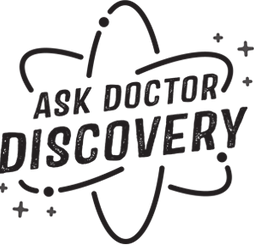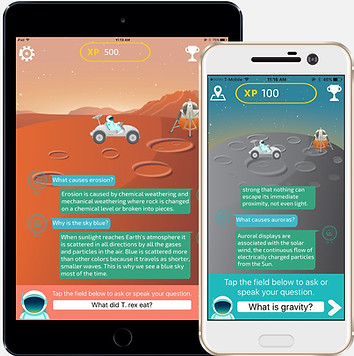Man (Echo) Su

The Ask Dr. Discovery project was a partnership between Arizona State University, the Arizona Science Center, and the Arizona Museum of Natural History that investigated how to use familiar technology, including smartphones and tablets, to address the pressing challenge of affordable, ongoing, large-scale museum evaluation while encouraging visitors to explore and engage deeply with museum content in astronomy, space science, and natural history.
What is Dr. Discovery?
Dr. Discovery is an educational and fun app for museum visitors which also provides important engagement metrics to museum partners.
One App, Two Purposes

For Museum Visitors
-
Enhances museum visit by offering clear, engaging explanations for all ages and science backgrounds.
-
Provides on-the-spot answers when staff aren’t nearby, helping visitors explore more deeply.
-
Offers kid-friendly, accurate information sourced from trusted scientific organizations (e.g., NASA, NSF, USGS) .
For Museum Partners
-
Offers an analytics portal that supports evidence-based decisions (e.g., adjustments to exhibit content and pathways based on visitor interests).
-
Enhances docent-visitor interactions by analyzing thousands of visitor questions to surface trends, inform and spark real-time conversations.
-
Provides clear, accessible insights without adding extra work for already busy museum teams.

Study Design

Research Foci
1. Visitor Behaviors
Nelson, B. C., Bowman, C. D., Bowman, J. D., Pérez Cortés, L. E., Adkins, A., Escalante, E., ... & Su, M. (2020). Ask Dr. Discovery: The impact of a casual mobile game on visitor engagement with science museum content. Educational Technology Research and Development, 68(1), 345-362. [Journal Article]
Pérez Cortés L. E., Ha, J., Su, M., Nelson, B., Bowman, C., & Bowman, J. (2023). Gleaning museum visitors’ behaviors by analyzing questions asked in a mobile app. Educational technology research and development, 71(3), 1209-1231. [Journal Article]
2. Visitor Group Interactions
Ha, J., Pérez Cortés, L. E., Su, M., Nelson, B. C., Bowman, C., & Bowman, J. D. (2021). The impact of a gamified mobile question-asking app on museum visitor group interactions: an ICAP framing. International Journal of Computer-Supported Collaborative Learning, 16(3), 367-401. [Journal Article]
3. Visitor Question-asking Quality
Su, M., Ha, J., Cortés, L. E. P., Bernier, J., Yan, L., Nelson, B. C., ... & Bowman, C. D. (2023). Understanding museum visitors’ question-asking through a mobile app. Educational technology research and development, 71(6), 2483-2506. [Journal Article]
Su, M., Pérez Cortés, L. E., Ha, J., Nelson, B., Bowman, C., Bowman, J., Bernier, J. & Yan, L. (2022, April). Understanding visitors’ question-asking quality in science museums through a question-asking mobile app. American Educational Research Association (AERA) Annual Meeting, San Diego, CA, USA. [Poster Presentation]

This project is funded by the National Science Foundation (NSF) through grant award #1438825
PI: Judd Bowman, Co-PI: Brian Nelson, Cassie Bowman